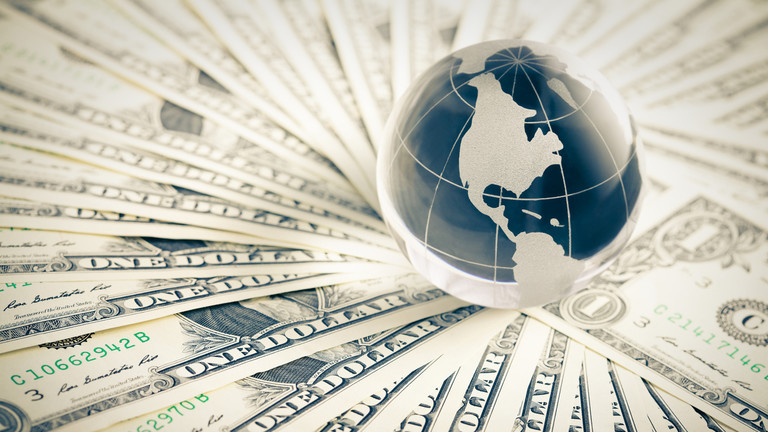Danish investment bank Saxo Bank has released its annual list of “outrageous predictions,” trying to assess some unlikely – but not impossible – events that could shake up the global financial markets after the trauma of 2020.
While the bank says the list is merely “a warning against the potential misallocation of risk among investors,” Chief Investment Officer Steen Jakobsen noted that there is one “not-so-outrageous prediction” for 2021. According to him, next year may become “a reality check to the idea that ‘extend and pretend’ can stretch to infinity and beyond.”
Notably, last year Saxo Bank was partly right about this year’s US elections, as it expected the Democrats to take control of the presidency and both houses of Congress. It also warned about the possible demise of the US dollar, which has seen a decline in 2020.

Say goodbye to globalization as ‘The Age of Disorder’ is coming – Deutsche Bank
Amazon buys Cyprus to create its own tax heaven
The 10-point list released on Tuesday starts with the possibility that US tech giant Amazon, having capitalized on coronavirus lockdowns, could buy Cyprus to turn it into its own corporate tax haven. In Saxo’s scenario, the tech giant first moves its headquarters to the island, and then it “literally buys” political power at all levels and further helps the country to rewrite its tax code. The updated law may mimic Ireland’s tax code, but with even lower levels of corporate and other levies.
Universal basic income & remote work destroys cities
The bank doesn’t seem to have much faith that the global economy will rapidly rebound after the unprecedented coronavirus crisis. It says that the pandemic has only accelerated the K-shaped recovery, which means that some sectors of the economy have bounced back while others are desperately lagging behind, further widening the inequality gap.

Covid pandemic could push more than a BILLION people worldwide into extreme poverty, UN warns
In such a situation when “societies are entirely torn apart,” the Covid-19 emergency measures may evolve into a permanent new universal basic income (UBI) reality, Saxo bank predicts, warning that the concept may “decimate” big cities. Coupled with tech-driven job redundancies and remote work, the UBI era could crush the commercial office and real property market. Young professionals may opt to stay in the communities where they grew up, while others could start leaving big cities, which are no longer so attractive in terms of job opportunities and life conditions.
Covid-19 vaccine could be ‘ultimate’ killer of economy
Global central banks have been busy printing more and more money to mitigate the economic fallout of the Covid pandemic. This has driven interest rates to nearly zero, forcing investors to shift to riskier assets.
Stock markets were rallying amid hopes that Covid-19 vaccines will be rolled out soon. However, instead of the anticipated recovery, it may add pressure on the already overheated economy, Saxo Bank predicts. This would spike inflation, forcing the Fed to increase long treasury yields, but the yield on riskier debt will also spike. At this point, many weaker companies could default.
Germany will have to bail out France
According to Saxo’s suggestions, Germany may have to “bail out” France to prevent the systemic collapse of the EU’s second-largest economy. France could face a wave of corporate bankruptcies that will eventually affect its banks, and it will have no “other choice but to come begging cap in hand to Germany, in order to allow the ECB to print enough euros to enable a massive bailout.”

Coronavirus pandemic could be twice as bad for global economy as WORLD WAR
Less alarming, but still crazy predictions
The rest of the possible events listed seem to be less alarming. Saxo Bank analysts say that China could further develop its digital yuan. The digital currency would not only rival the US dollar, but also open up the Chinese capital market for foreigners and boost the country’s economy.
Next year may become a turning point for “woefully underestimated” emerging economies. Their growth would be driven by better access to technologies and education.
As the coronavirus exacerbates wealth inequality, the bank suggested creating what it calls a “Citizens Technology Fund” to avoid political upheavals and social unrest. Strange as it may appear, the idea is to transfer a portion of asset ownership of capital assets to everyone.
The bank’s analysts also said that in 2021 artificial intelligence (AI) algorithms may pave the way for commercial fusion energy, while blockchain technology could somehow become our shield from fake news. Saxo Bank also expects stronger demand for silver in 2021, which will drive up the price of the metal.

 NEWS2 months ago
NEWS2 months ago
 NEWS2 months ago
NEWS2 months ago
 NEWS2 months ago
NEWS2 months ago
 INVESTMENTS2 months ago
INVESTMENTS2 months ago
 FINANCE2 months ago
FINANCE2 months ago
 FINANCE2 months ago
FINANCE2 months ago
 WAR2 months ago
WAR2 months ago

































